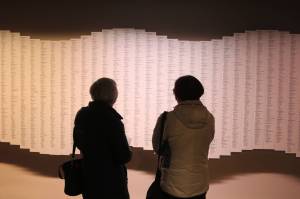A Voice From the Winthrop: Kerry Hudson
Published 12:00 am Thursday, August 27, 2009
Kerry Hudson moved from Spokane when he was nine years old, and grew up in the old Salishan housing development. Later, his family moved to Tacoma’s North End. But none of these places equaled the energy and convenience of living in downtown Tacoma. Today, 47-year-old Hudson lives on the ninth floor of the Winthrop a 12-story, 84-year-old former historic hotel on the corner of Ninth and Commerce.
“I’m a downtown person,” he says. During an interview at a coffee shop across the street from his apartment building, Hudson is wearing a blue polo shirt, jeans, and tennis shoes. He has short brown hair flecked with bits of gray (like his mustache), which forms an early-stage widow’s peak. When he smiles, his eyes match his grin with friendly crow’s feet. “I like living downtown. It’s convenient for me.”
Hudson arrived at the Winthrop two years ago this month. After nearly two decades working as a baker, he developed Chronic Obstructive Pulmonary Disease (COPD) — a progressive disease that makes it hard to breathe. “When you are working in a bakery, you are breathing in flour, oil, sugars, smoke — all these terrible things that really aren’t all that good for you,” he explains. “There was no protection for me. I don’t know exactly how it works inside the body, but basically for me, I wake up in the morning and I cough. My airway is kind of constricted so it’s harder to breathe.” Hudson pauses, cracking a somewhat guilty smile. “To be honest, if I quit smoking, it would probably get a little better.”
Like most Winthrop residents, he lives on a fixed income. His pay checks come from the General Assistance for the Unemployed; one-third of that money pays the rent on his one-bedroom apartment. Hudson says he also receives job counseling from the Division of Vocational Rehabilitation. He wants more education and work skills. He would like to attend Tacoma Community College next winter in order to achieve his short-term goal of becoming a paralegal, and long-term goal of becoming an advocate for non-custodial parents.
Hudson is one of nearly 200 people who qualify as low-income and live in the Winthrop. The building is the focus of much attention.
Nearby merchants have long complained the Winthrop is a magnet for criminal activity that stunts the economic hopes of small business owners. The building has consistently topped a list of locations for downtown emergency service calls. This month, four fires were set in the Winthrop by someone Tacoma firefighters and police officers say is a serial arsonist. A Crime Stoppers bulletin was issued last week offering $1,000 for information leading to the arrest of the arsonist.
Some want to see the Winthrop restored as an historic hotel; others point to the building’s track record as a magnet for crime and emergency service calls, and want it shut down; and still others want city leaders to find alternate housing so residents aren’t concentrated in one location. In May, Tacoma Housing Authority (THA) announced that it was asked by Prium (the current building owner who had originally planned to convert the building into a four-star hotel) if it wanted to purchase the building. THA is currently weighing that decision.
Hudson is the latest subject of the Tacoma Daily Index‘s series of interviews with Winthrop residents. Here is what he had to say about his life and experience living in the Winthrop.
“I’m a downtown person. I like living downtown.”
I was born in Orofino, Idaho. My family — mom, dad, and four siblings — moved to Spokane in 1957 or 1958, and then we migrated west to Tacoma in 1971. I’ve been here ever since. We started out at the old Salishan, before they started doing all the renovations. Then we moved out to the North End. I’ve lived in almost every part of Tacoma, either as a child or as an adult.
“I actually wanted to be a baker.”
I made it through the tenth grade before I got really bored. I got my General Equivalency Degree and went down to a trade school in Oregon. I didn’t quite make it through the carpenter program. I came back to Tacoma, spent another three or four years here, and then went back to trade school to take up maintenance. I actually wanted to be a baker. Before I went into Job Corps, I started out at a bakery at the old bus stop [near 11th and Commerce]. Do you know where the Mad Hat Tea Company is located? That used to be a donut shop, hamburger stand, video arcade, and a place where you paid to get on the bus. That was also the place where all the kids hung out. The transients. They weren’t really homeless people. They weren’t what you see today — a bunch of gang-bangers beating each other up. They were people who needed a community to hang out. So they kind of hung out at the bus stop. I worked there for almost a year before I went into Job Corps. When I went into Job Corps, they told me I never would make it as a baker. They put me in the maintenance program. I got out and went back to work at a bakery. That’s what I did for the next 19 years. I don’t know what inspired me to go back into baking. I think it was probably that I couldn’t find any real maintenance jobs. I ran into a friend and he said, “Why don’t you come work in the bakery here?” It progressed from there. The bakery re-opened as Casey’s. The guy who re-opened it was one of the guys who used to work there. He hired me and brought me on as a full-time baker. From there it was Winchell’s, Safeway, Albertsons, Bag N Save — I’ve been in a lot of different bakeries, including Frisbee’s Bakery when it was still open.
“I wake up in the morning and I cough.”
I came down with a respiratory condition called Chronic Obstructive Pulmonary Disease (COPD). When you are working in a bakery, you are breathing in flour, oil, sugars, smoke — all these terrible things that really aren’t all that good for you. I don’t know now, it’s been a while since I’ve been in it, but I think a lot has changed and they probably wear masks now. But they didn’t then. There was no protection for you. I don’t know exactly how it works inside the body, but basically for me, I wake up in the morning and I cough. That’s one of the things that is caused by COPD. Your airway is kind of constricted so it’s harder to breathe. I’ve seen other people who need oxygen, but they don’t cough. After I couldn’t bake anymore, I tried running my own cleaning business. My then-wife was having kids. I needed a better and more stable income and that didn’t really work out. I ran a couple of convenience stores. I really got frustrated with that. Very repetitious — same stuff, different day. So I went into apartment management. I delivered newspapers in between just to keep money coming in. I managed the Emerson Apartments on Ninth and Fawcett, and I managed the Porter Apartments. That was kind of fun. From there, I moved in with a friend for a couple months while waiting to get in the Winthrop.
“The Winthrop was the one place I knew that would accept people in my situation.”
I applied at the Winthrop in March 2007. It was August 2007 before I could move in. The Winthrop was the one place I knew that would accept people in my situation. I’m currently classified as disabled. Not just COPD. I also suffer from depression, which is a whole different story. I live on the ninth floor. I look out onto the south end of downtown and the freeway. When I moved in and looked out the window, I thought, “This is a great view.” As far as living on the ninth floor, I’m kind of prejudiced. I think it’s one of the best floors in the building. We’ve got people who are either in my age group or older. My next door neighbor has lived there since God was a kid. He’s a quiet guy. We don’t have a whole lot of conflict. In fact, I don’t think I’ve ever had conflict up there. People look out for each other. I was having dinner with one of my neighbors. She and I were just sitting down to dinner. There came a knock at the door. She opens the door and a guy walks in and says, “What you got to eat?” We kind of looked at him like, “Excuse me?” But she just prepared him a plate and he sat down with us for dinner. He lived on the same floor, in the corner of the hallway. He’s a harmless guy. I found out later that she had helped him out in the past with food. What struck me about it was that it wasn’t a matter of, “What are you, some kind of nut job? Get out of here!” It was, “OK, the guy needs help. We’ll help him out.” That’s what I get there. When somebody needs help, we help them out.
“There are going to be some problems. You can’t keep all the bad guys out, so to speak.”
It’s a big building. There are going to be some problems. You can’t keep all the bad guys out, so to speak. In a low-income building, you have to live with that. On the ninth floor, I don’t see it. I’ve seen people coming and going from the lobby and people in the elevator I would wonder about. But I don’t pass judgement on them. On my floor, there is a young lady with a kid. I know other people would pass judgement on her immediately. But I know from personal experience that she’s Christian and a very decent person. I’ve talked to her quite a few times and she’s always friendly to me. And then there’s Nanette [Colby], who you did the other interview with. I don’t know her real well, but every time I see her she’s a positive person. She’s happy and friendly. I always talk to her kid. I love all the kids in that building. They are all so young and friendly still. They haven’t been jaded like some of the older kids and adults.
“I would say the only thing I really don’t like is the occasional situation where we get a serial fire alarm puller.”
I don’t really see anything bad or good about the building. I look at it in terms of what I like or don’t like. I would say the only thing I really don’t like is the occasional situation where we get a serial fire alarm puller. The other night, I was right in the middle of a movie I had never seen before, it was on TV. I watch so little TV that when I do sit down to watch a movie, it’s kind of important. Right in the middle of the movie, the fire alarm goes off. So I miss about a half-an-hour of my movie. I’ll be in the middle of a project on the computer and the fire alarm goes on. Or at 3:30 in the morning. I know it’s hard on the owners and managers on the building because from what I’ve heard, and I could be wrong about this, but there is a fine involved with so many false alarms.
“I refuse to accept that the people in that building are dirt and all of the other words you can use.”
As far as what I like, I like living in the downtown area. I like where the Winthrop is situated. It’s convenient for me. I like the fact that the few times I’ve actually had a maintenance issue, it’s been addressed. As far as the environment I live in, the building is quiet. I don’t mess with people, people don’t mess with me. Occasionally, I get a knock on the door for computer help because that’s my specialty. But a lot of times I spend my day reading and studying on the computer. I’m a huge fan of learning. Really, I like most of the people I’ve met. I refuse to accept that the people in that building are dirt and all of the other words you can use. I know there’s one lady most people get frustrated with. When I first moved in, I would greet her every time I saw her sitting in the lobby. She would yell at me because of the way I greeted her. I stopped greeting her that way and started greeting her the way she was comfortable with, and now ever since then, she comes up to me to say hello or tell me about current events or give me warnings about things that are going on. It’s all about how you approach people. You’re not going to please everybody. But I don’t make it a mission to get people mad at me.
“I don’t think it’s the building. I think it’s the nature of the neighborhood more than anything.”
It’s not the building that has earned the bad reputation. The people on the outside of the building, most of them have never been inside the building. The cop car that is sitting outside the building is not there because some criminal activity is going on. It’s there because the officer is inside the building as a part of the “crowd control,” so to speak. The people who are loitering on the corner, those aren’t people who live in the building. There are a few from the building who go out there. It’s been my experience the management of the Winthrop is very strict with the rule that you escort your people in and out of the building. The other night, I had some people knock on my door. They were a couple missionaries. I told them, “You don’t belong in the building wandering around.” It’s not that I was opposed to their religion or what they had to say. But that’s the building rule. Most of the people I talk to are very serious about enforcing that rule. They will take steps on their own to make sure it is enforced. If they see somebody in the hall or trying to get into the building, they will ask if they have their key card or if they live here. The people outside the building and wandering around are the same people you are going to see wandering around on South Tacoma Way or up on the Hilltop or over on the East Side. Those are other neighborhoods that have reputations. Really, it’s the neighborhood transit center that is more of a draw. When I was working at the bus stop, that area, where the transit center was, it was a huge draw for homeless people, drug dealers, and runaway kids. Wherever you have a bus station, you’re going to have that. I don’t think it’s the building. I think it’s the nature of the neighborhood more than anything.

"It's a big building," says Winthrop resident Kerry Hudson. "There are going to be some problems. You can't keep all the bad guys out, so to speak. In a low-income building, you have to live with that." (PHOTO BY TODD MATTHEWS)
To read the complete series of interviews with Winthrop Hotel residents, click on the following links:
- A Voice From the Winthrop: Glenn Grigsby (Tacoma Daily Index, June 16, 2009)
- A Voice From the Winthrop: Otha Adams (Tacoma Daily Index, June 26, 2009)
- A Voice From the Winthrop: Nanette Colby (Tacoma Daily Index, July 15, 2009)
- A Voice From the Winthrop: John Heffler (Tacoma Daily Index, July 30, 2009)
- A Voice From the Winthrop: David Allen (Tacoma Daily Index, August 13, 2009)
- A Voice From the Winthrop: David Miller (Tacoma Daily Index, August 20, 2009)
- A Voice From the Winthrop: Kerry Hudson (Tacoma Daily Index, August 27, 2009)
- A Voice From the Winthrop: Jessica Creso (Tacoma Daily Index, September 1, 2009)
Todd Matthews is editor of the Tacoma Daily Index and recipient of an award for Outstanding Achievement in Media from the Washington State Department of Archaeology and Historic Preservation for his work covering historic preservation in Tacoma and Pierce County. He has earned four awards from the Society of Professional Journalists, including third-place honors for his feature article about the University of Washington’s Innocence Project; first-place honors for his feature article about Seattle’s bike messengers; third-place honors for his feature interview with Prison Legal News founder Paul Wright; and second-place honors for his feature article about whistle-blowers in Washington State. His work has also appeared in All About Jazz, City Arts Tacoma, Earshot Jazz, Homeland Security Today, Jazz Steps, Journal of the San Juans, Lynnwood-Mountlake Terrace Enterprise, Prison Legal News, Rain Taxi, Real Change, Seattle Business Monthly, Seattle magazine, Tablet, Washington CEO, Washington Law & Politics, and Washington Free Press. He is a graduate of the University of Washington and holds a bachelor’s degree in communications. His journalism is collected online at wahmee.com.




